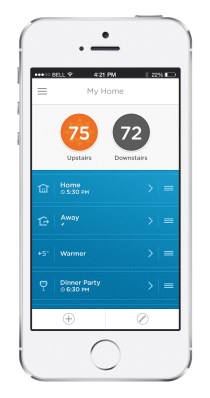It was only a matter of time before veterans of the home temperature-regulating industry took bold steps to compete with Nest, the current darling of the “connected home” scene.
You can’t blame them for feeling a bit neglected. After all, Honeywell was the first to popularize the circular thermostat control, about 60 years before Nest did it — the “Honeywell Round” originally launched in 1953.
And today the company is unveiling the “Lyric,” its new take on home temperature management. The new thermostat is the first product in an upcoming family of home-related devices Honeywell plans to offer.
The pitch for Lyric: Through its connection to your and your family members’ smartphones, it can detect when you’re home or away, and can automatically adjust your home’s temperature according to the preferences you’ve previously set. This means that you could tell it that you’d like your home’s temperature to be 71 degrees when you’re home and 65 when you’re away, and that you’d like it to start warming the house up when you’re within a certain radius of your house.
“Every day is different. The idea of having a predictable schedule is a fantasy,” Honeywell vice president Tony Uttley told VentureBeat.
“When I’m home, I’m comfortable, and when I’m gone, I save money,” he said.
The Lyric thermostat sports various settings. In addition to the basic “home” and “away” options, you can choose options like “people are over.” Uttley said that people commonly prefer cooler temperatures when guests are over, as people’s body heat can raise the room temperature.
“We also designed it to be mobile first, and we want it to be ‘do it yourself’ first,” Uttley said. You can set your preferences in Lyric’s mobile app, while the wall control can also show outside temperatures, as the company found it’s the main thing people check it for.
But this is only one of the possibilities the company envisions. As it eventually connects to other home devices such as security alarms, lighting systems, and more, Honeywell hopes that more complex and sophisticated settings will come into play. For example, a “going to bed” setting could mean setting a certain temperature, turning on the home security alarm, and turning off all house lights except the front porch.
“Honeywell has been in the home, and your mechanical room, and in your wall for a long time,” said Uttley.
Along with the advantages of already having worked on many of these devices that are already in people’s homes, Honeywell also has an extensive network of professionals who have been installing and promoting the company’s products to their customers. Honeywell is hoping that its ability to recommend quality local HVAC professionals to its customers will add to the experience it hopes to sell. That means when your heating or air conditioning system breaks, Honeywell or your Honeywell-using neighbors can tell you who to call for a quick and cheap service.
So… Nest?
Naturally, we asked, “What about Nest?”
“We’ve taken a very different approach to what a connected home is, and what comfort is,” said Uttley.
In contrast to Nest’s “learning thermostat” image, Honeywell’s argument is again that “every day is different” and that it’s more about figuring out different settings for different situations than teaching your thermostat to predict your preferences during the day based on a supposed routine.
Two years ago, Honeywell actually sued Nest over patent infringements, citing a number of similarities to its Total Connect Comfort Systems. Honeywell also sued Best Buy for selling Nest thermostats.
What’s making this competition even more interesting is that while Nest rose to fame for its thermostat, it also released (and then recalled) a smoke alarm, the Nest Protect. Nest chief executive Tony Fadell recently said that the company is looking at all sorts of “unloved” devices in the home.
So it looks like these two companies are headed for a connected-home smackdown, not just a dustup over temperature control.
Apple’s HomeKit, which it announced last week at its World Wide Developer Conference, will also likely make for an interesting combatant in this battle. Although Fadell helped create Apple’s iPod, he left Apple to found Nest. Then, he recently sold Nest to Apple rival Google for $3.2 billion.
Nest was noticeably absent from the list of HomeKit partners posted during the HomeKit announcement on stage last week.
Uttley doesn’t seem worried about competing with Apple on the one hand and Google on the other. He confidently reminded me, “We invented the round thermostat.”
Honeywell will first sell its Lyric thermostat through its professional channels for $279, and it will launch the product in Lowe’s on August 1.
VentureBeat's mission is to be a digital town square for technical decision-makers to gain knowledge about transformative enterprise technology and transact. Learn More

